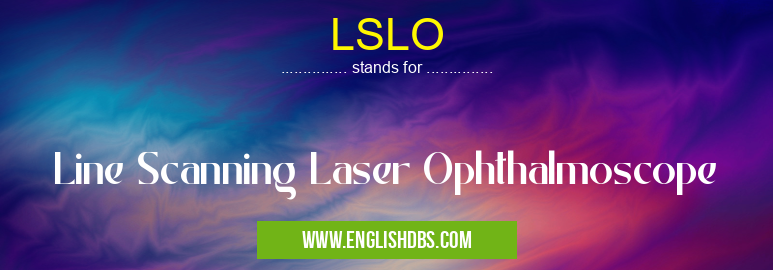What does LSLO mean in UNCLASSIFIED
A Line Scanning Laser Ophthalmoscope (LSLO) is an imaging device that uses laser light to capture images of the retina. It can be used in both clinical and research settings for the diagnosis and study of retinal diseases. The LSLO produces high-resolution images that are more detailed than ones produced by traditional fundus cameras, providing more accurate diagnoses and better insights into eye health.

LSLO meaning in Unclassified in Miscellaneous
LSLO mostly used in an acronym Unclassified in Category Miscellaneous that means Line Scanning Laser Ophthalmoscope
Shorthand: LSLO,
Full Form: Line Scanning Laser Ophthalmoscope
For more information of "Line Scanning Laser Ophthalmoscope", see the section below.
Essential Questions and Answers on Line Scanning Laser Ophthalmoscope in "MISCELLANEOUS»UNFILED"
What is a Line Scanning Laser Ophthalmoscope?
A Line Scanning Laser Ophthalmoscope (LSLO) is an imaging device that uses laser light to capture images of the retina. It can be used in both clinical and research settings for the diagnosis and study of retinal diseases.
How does a Line Scanning Laser Ophthalmoscope work?
The LSLO emits low-intensity laser light onto the eye which reflects off of the structures inside the eye. This reflected light is then detected by an image sensor on the instrument, creating a high-resolution image of the retina.
What are some advantages of using a Line Scanning Laser Ophthalmoscope instead of a fundus camera?
The LSLO produces higher-resolution images than those created by traditional fundus cameras, providing more accurate diagnoses and better insights into eye health. Additionally, it has smaller dimensions with increased portability compared to fundus cameras and can be used in both clinical and research settings.
What kind of retinal disorders can be detected using a LSLO?
A Line Scanning Laser Ophthalmoscope can detect a range of retinal diseases including age-related macular degeneration, diabetic retinopathy, hypertensive retinopathy, epiretinal membrane, choroidal neovascularization, vitreomaculopathy, Stargardt's disease etc..
Can it also detect other ocular problems such as cataracts or glaucoma?
No, LSLO's cannot detect cataracts or glaucoma as these conditions affect other parts of the eye such as the lens or optic nerve respectively which cannot be seen directly with this instrument's technology.
Final Words:
The line scanning laser ophthalmoscope is an advanced imaging tool for diagnosing and studying retinal diseases with greater precision than traditional instruments. It can provide clinicians with useful information about various pathologies affecting the posterior segment of their patient's eyes which may ultimately result in improved outcomes for patients suffering from vision-threatening conditions affecting their eyesight.
